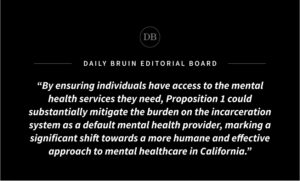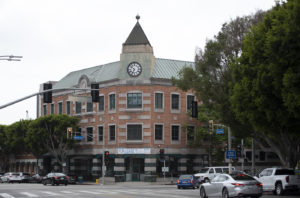This post was updated March 6 at 1:19 p.m.
Policy experts remain largely skeptical of the merits of Proposition 1, which plans to reallocate and add state funding toward housing and treatment for unhoused people with mental illness.
First proposed by Gov. Gavin Newsom, the measure is up for vote as part of Tuesday’s primary elections and would serve as a two-part initiative.
First, it would amend the 2004 Mental Health Services Act – sometimes called the “millionaires’ tax” – to divert a larger portion of its funding toward the state. According to estimates by the Legislative Analyst’s Office, this shift would double the state funding available from MHSA. With the new policy, up to 10% of MHSA’s budget – about $140 million annually – would be made available to the state, with the remaining 90% of funds continuing to go toward counties’ public mental health services.
Second, the proposition would authorize a new $6.4 billion state bond to build new facilities for mental health and addiction treatment, as well as construct and transform buildings into new housing for people experiencing or at risk of homelessness and who have issues with mental health or addiction.
Toby Hur, field education faculty of social welfare, said different interests at play in the push for Proposition 1 – including Newsom’s political agenda – may ignore a more causal and health-based strategy in favor of strategies similar to those of the past, despite the prevalence of homelessness continuing to increase and disproportionately affecting people of color.
“It’s not affordable to find a place to live, period,” he said. “Poverty, history of racism – you look at who is still impacted by homelessness in places like downtown. Countywide the percentage of African Americans is less than 10%, but it’s close to 50% in downtown. Why is that? Why do we let it persist?”
However, despite the possible benefits of a more comprehensive approach, the current political system makes it difficult to pass large legislative packages and continuously fund responses to an issue the public has grown weary of, Hur said.
In 2023, the United States Department of Housing and Urban Development estimated there were just over 181,000 people experiencing homelessness in California, accounting for about 28% of the unhoused population across the country. In Los Angeles, the 2023 Greater LA Homeless Count estimated there were around 46,260 unhoused people in the city, noting a 10% rise from the previous year, according to the LA Homeless Services Authority.
Hur added that with Proposition 1 coming soon after the passage of the Community Assistance, Recovery and Empowerment Act, the new policy and funding would build upon that law to potentially expand involuntary treatment centers for people with mental health issues, raising criticism against the proposition as a further step towards involuntary institutionalization. The CARE Act, which created a new system of civil court intervention for the treatment of individuals experiencing severe mental illness, took effect Dec. 1 in LA County.
“The pushback from the community is the filth, the crime, rather than focusing on the nature of addiction and the widespread mental illness going untreated, rather than dealing with it as a public health issue,” Hur said.
According to estimates by the Legislative Analyst’s Office, up to $4.4 billion of the bond would go to the state program to build new treatment centers, with about a third of the funding allocated to local governments. The remaining $2 billion would be allocated in state loans or grants to local governments for the construction of approximately 4,350 new housing units, according to the LAO.
On Feb. 16, the American Civil Liberties Union announced opposition to the measure on the grounds that it would support involuntary institutionalization, take funds away from existing community mental health services and amount to a very minimal change in housing opportunities, said Eve Garrow, an ACLU policy analyst and advocate, adding that the proposition was estimated to affect only about 3% of the statewide unhoused population.
Garrow added she believes California tax policies could be amended to reduce tax breaks and instead use those funds for spending on critical issues.
“We need tax equity instead of hurting some vulnerable people in order to help other vulnerable people,” Garrow said.
Hur said he believed the amount of Proposition 1’s bond was not insignificant and would likely be followed by other new legislation that may bring further funding. However, he added that since state programs are likely to take away from local funding, he would like to see more local input and oversight involved in state-level decision-making.
Zev Yaroslavsky, the director of the Luskin School of Public Affairs’ LA Initiative, said in an emailed statement that the crisis must be addressed with the provision of housing and mental health services as well as a response to the causes of homelessness.
Yaroslavsky, a former member of the LA County Board of Supervisors and the LA City Council, added in the statement that he believes Proposition 1 provides both and that he supports it. He said homelessness will not be solved with a quick solution but instead with steady progress.
Garrow said there is concern that the proposition would slash funding for existing community-based mental health programs, including supportive early intervention and prevention programs, creating dangerous resource shortages while doing little to solve the problem it tackles. Many of these existing services are useful but struggle to meet needs because of their ongoing lack of resources, she said.
Chris Herring, an assistant professor of sociology, said the proposition seems motivated by Newsom’s desire to appear decisive and bold in addressing hot topic issues, such as homelessness, while avoiding creating new funding.
He added that he is concerned about the risks the proposition may present to existing community health programs and about the lack of specificity or oversight regarding the use of the funding in the proposition.
“Creating more beds that are in demand are good, but there’s no plan at all for how people will be supported, or if there will be continual money and funding after that, which would just put us back at square one,” Herring said.






Comments are closed.